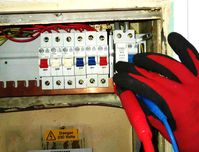2026 EICR Deadline: Protect Your Property Before the Fines Hit

If you’re a landlord or managing property in 2026, there’s one thing that’s likely to appear on your to-do list sooner rather than later: renewing your Electrical Installation Condition Report, better known as an EICR. A local housing authority may impose a financial penalty of up to £30,000 for a landlord’s breach of the duty (not having a valid EICR) under the Regulations.
When new rules came in a few years ago requiring landlords to have electrical safety checks carried out at least every five years, most rental properties received their first certificates around 2020 and 2021. Which means many those certificates are now due for renewal.
And with thousands of properties all hitting that five-year mark at roughly the same time, demand for electricians is only going one way — up.
A Quick Refresher: What Is an EICR?
An EICR is a formal inspection of a property’s electrical wiring and fixed electrical components. A qualified electrician checks everything from the fuse board to sockets and circuits, to make sure the property is safe and doesn’t pose a fire or shock risk.
If issues are found, the report will highlight them and explain what needs to be put right. If everything is safe, the report confirms the property is compliant.
For rental homes in England, this report must be renewed at least every five years or earlier if recommended by the electrician.
What Will EICRs Cost in 2026?
| Property Size | Typical Cost (2026) |
| 1-bed flat | £100 - £150 |
| 2–3 bed house | £150 - £250 |
| Larger / older homes | £250 - £450+ |
| Small commercial units | £300 - £600+ |
Costs vary depending on the size and layout of the property, but these are the typical price ranges for this year:
If the electrician finds issues, any repair or remedial work is quoted separately. This is where costs can climb for older properties with outdated wiring, so it’s worth budgeting ahead.
Why It’s Worth Planning Ahead
Many landlords are now realising they’ll need multiple renewals across their portfolio within the same year. If left until the last minute, you may:
- Struggle to secure bookings at short notice
- Pay higher prices during peak demand
- Risk being out of compliance if the certificate lapses
- Face delays in letting or renewing tenancies
Booking inspections early in the year can avoid a rush later.
Avoid the Fuss
If you’d rather not chase around for availability, Efficient Home Energy offers a simple solution. The team usually has next-day availability, provides fast turnaround on reports, and can handle remedial work if needed. Ideal for landlords managing multiple properties or tight schedules.
A Smooth Way to Manage Renewals
If you manage several properties, it helps to:
1. Make a list of when each certificate expires
2. Spread renewals throughout the year, not all at once
3. Keep digital copies of reports for quick access
4. Use the same qualified provider for consistency
Most electricians will also advise how long you can reasonably schedule before your certificate expires, so you don’t leave gaps or risk non-compliance.
The Bottom Line
With so many EICRs set to expire in 2025/2026, landlords and property managers who plan ahead will avoid the price rises, fines and availability crunch that are likely to follow. A quick check of your certificate dates now could save time, money and unnecessary stress later in the year.

